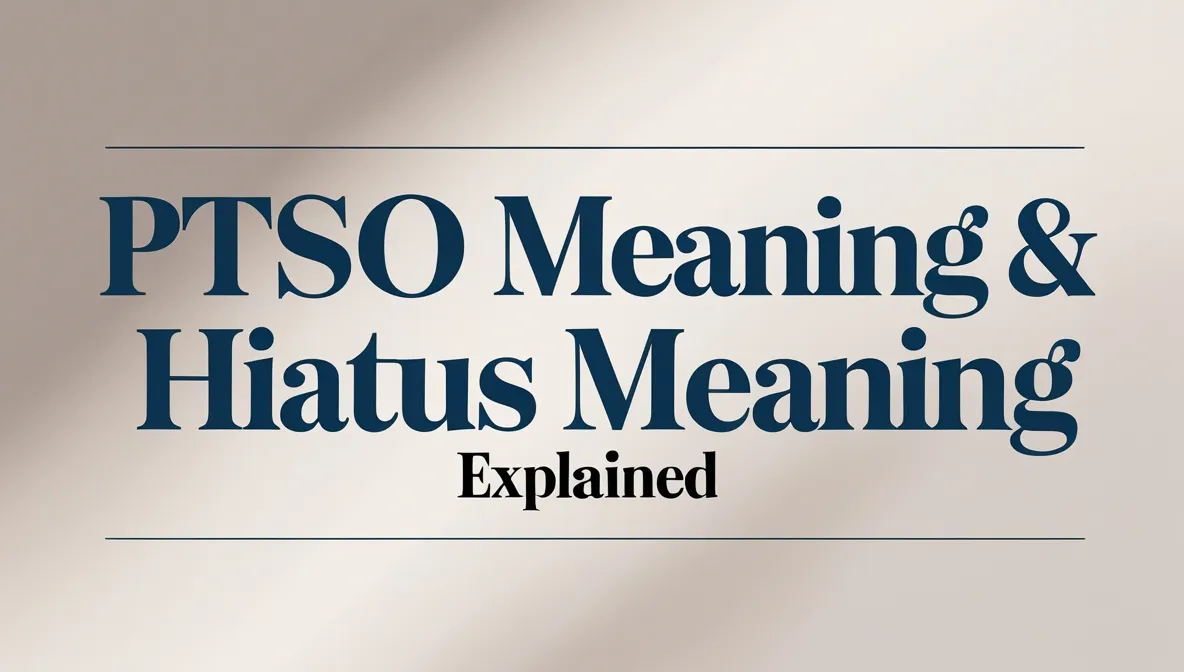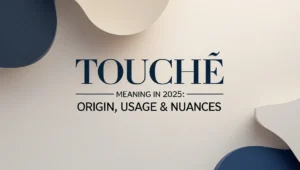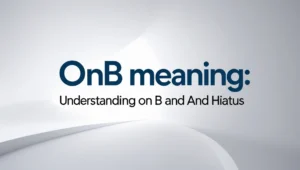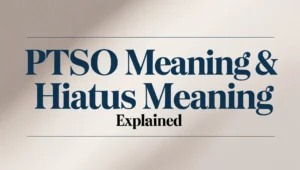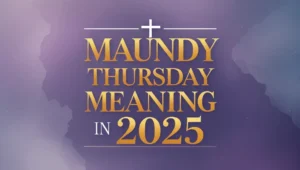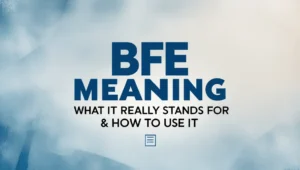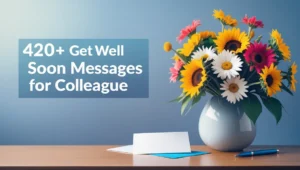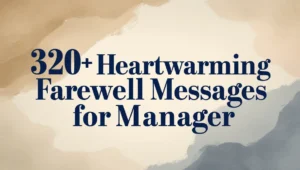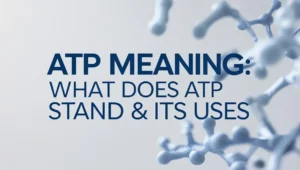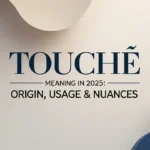In 2025, the digital world moves faster than ever—and so does the language we use. Terms like PTSO and hiatus have gained popularity in conversations across social media, workplaces, and academic settings. But what exactly do they mean, and why are they so relevant today? Whether you’re trying to understand a post on Instagram or clarify the usage in a college paper, this guide will walk you through the PTSO meaning and the hiatus meaning, making both easy to understand and apply in real life.
What Does PTSO Mean in 2025?
Let’s start with the more unfamiliar term: PTSO. While it might look like a typo or variation of the widely known PTSD, it actually holds its own place in modern dialogue.
PTSO Meaning (Primary Definition)
PTSO typically stands for Post-Traumatic Stress Order. It is a less formal version of PTSD (Post-Traumatic Stress Disorder), and it’s increasingly used in casual or non-clinical settings. The word “order” in this context points more to the lasting emotional and behavioral patterns that develop after experiencing trauma, without necessarily labeling it as a “disorder.”
This shift in terminology is especially embraced by mental health advocates who prefer less stigmatizing language. It reflects how people talk about emotional wellness on platforms like TikTok, Reddit, and Instagram—where real stories are shared openly, and the vocabulary often evolves faster than official psychology terms.
Other Contextual Uses of PTSO
Although Post-Traumatic Stress Order is the most widely discussed use of PTSO in 2025, there are a couple of alternative meanings based on context:
- Parent Teacher Student Organization – Common in school systems, this use refers to a collaborative group that supports students, teachers, and parents through events and resources.
- Please Turn Something Off – This is a much rarer slang or humorous use in digital communication, typically informal.
Despite these alternatives, in modern online discussions—especially those focused on mental health—PTSO is mainly tied to trauma-related conversations.
What Does Hiatus Mean in 2025?
Unlike PTSO, the word hiatus has been around for centuries. However, in recent years, it has taken on renewed relevance, especially in digital and creative communities.
Hiatus Meaning (Modern Usage)
A hiatus refers to a temporary pause or break in an activity or routine. It can apply to nearly anything—work, education, social media, relationships, or even a favorite TV series.
Here are some ways you might hear it in 2025:
- A content creator saying, “I’m taking a hiatus from posting to focus on my mental health.”
- A student sharing, “I decided to take a hiatus from school for a semester.”
- A company announcing a “hiatus in production” due to restructuring or market shifts.
In all these cases, the core meaning remains the same: a pause, not a full stop. It implies intention, planning, and often, self-care.
Why the Word ‘Hiatus’ Feels So Relevant Today
As mental health awareness grows and burnout becomes a more openly discussed issue, taking breaks is no longer frowned upon. In fact, taking a hiatus is often viewed as a strong, mindful choice. This shift in cultural thinking has led to the word becoming more mainstream and respected, especially among Gen Z and Millennials.
People no longer feel the need to “power through” exhaustion. Instead, announcing a hiatus on platforms like YouTube or Twitter is seen as a form of empowerment and prioritizing well-being.
PTSO vs Hiatus: Understanding the Difference
While both PTSO and hiatus are tied to stress or overwhelming situations, they represent very different ideas.
PTSO relates to a condition or emotional state that follows trauma. It reflects something that happens to you—something you may not have full control over. It often requires therapy, time, and support to process.
Hiatus, on the other hand, is a choice—an intentional decision to take a break, recharge, or redirect focus. It’s proactive rather than reactive.
So if someone says they are “on hiatus,” they’ve made a decision. If someone is dealing with PTSO, they’re navigating the emotional aftermath of something that impacted them deeply.
Understanding this difference helps us respond with empathy and clarity in both personal and professional situations.
How These Terms Are Used in 2025 Conversations
You’re likely to encounter both terms on social platforms, blogs, and even in workplace conversations. Let’s look at a few examples of how they naturally appear:
- PTSO in use: “After the accident, I didn’t feel like myself for months. I’ve been dealing with PTSO, and therapy has helped a lot.”
- Hiatus in use: “Hey friends, I’m going on a short hiatus from social media to focus on my mental health. Thanks for understanding.”
In both cases, the speaker is being vulnerable—but using different language based on whether they’re reacting to trauma or making a conscious lifestyle choice.
Why These Words Matter in 2025 and Beyond
Language reflects how society evolves, and words like PTSO and hiatus are perfect examples of this change.
They give us better ways to express what we’re feeling, what we’ve been through, or what we need in a moment. They allow for more mental health awareness, self-care, and respectful communication.
More importantly, understanding them helps you stay informed and connected in conversations that matter—whether you’re in a classroom, in a workplace, or online.
Top 5 FAQs About PTSO and Hiatus
1. Is PTSO a real medical condition? Not officially. While PTSO is used in casual and advocacy circles, it’s not yet recognized as a medical diagnosis like PTSD. It reflects a similar experience but uses different, often softer language.
2. How long can a hiatus last? There’s no fixed rule. A hiatus can last days, weeks, or even months. What matters is the intention behind it and how it serves your personal or professional needs.
3. Can PTSO be healed over time? Yes, many people dealing with PTSO find healing through therapy, support systems, mindfulness, and time. Recovery is possible, but the journey looks different for everyone.
4. Is it okay to take a hiatus for mental health? Absolutely. In fact, more companies and schools now support mental health breaks. A hiatus is often encouraged as a way to prevent burnout and promote well-being.
5. Are these terms used globally or just online? While both terms are heavily used online, especially in English-speaking countries, they are becoming more common globally as mental health discussions grow across cultures.
Conclusion
As we navigate the complex realities of 2025, the way we talk about our experiences matters more than ever. Knowing the PTSO meaning helps you understand the emotional and psychological responses to trauma, while understanding the hiatus meaning allows you to value the importance of intentional rest.Both words reflect the times we live in—where emotional intelligence, mental health, and thoughtful communication are more than just buzzwords; they’re essentials. Whether you’re taking a hiatus or working through PTSO, using the right language can make all the difference in how you understand yourself and others.

